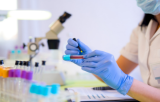
Metabolism Research
Metabolic research studies various aspects of cellular metabolism, including the breakdown of nutrients to produce energy, the synthesis of complex molecules and the regulation of metabolic pathways. Researchers in this field can investigate metabolic disorders, energy production and the interaction of different pathways within cells. Techniques such as metabolic labeling, mass spectrometry and enzyme assays are commonly used to study metabolic processes.
Protein assay kits:
Protein assays are used to determine the concentration of proteins in a sample. Several methods are available for quantifying proteins, including colorimetric assays (such as the Bradford, BCA and Lowry assays) and fluorescence-based assays (such as the Qubit assay). These kits provide researchers with a standardized approach to accurately measure protein concentrations, which is essential for a variety of biological and biochemical studies.
In metabolic research, protein assays are particularly useful for quantifying enzymes and other proteins involved in metabolic pathways. This information helps researchers to understand the dynamics of metabolic processes and how they may be altered under different conditions.
Metabolic research and the use of protein analysis kits are fundamental elements in advancing our understanding of cellular functions, disease mechanisms and potential therapeutic targets. Always ensure that you use validated kits and follow best practices to obtain accurate and reproducible results in your research efforts.
- The colorimetric method
A technique widely used in metabolic research to measure the concentration of various compounds, including proteins and metabolites, based on the color change produced by a chemical reaction. This method is particularly valuable in the study of metabolic pathways, as it enables researchers to quantify the levels of specific molecules involved in these pathways.
In metabolic research, the colorimetric method can be applied in a number of ways:
Protein quantification: colorimetric assays, such as the Bradford test, the BCA test and the Lowry test, are commonly used to quantify protein concentrations. These tests rely on the reaction between proteins and specific chemical reagents to produce color changes. The intensity of the color change is proportional to the amount of protein present in the sample, which can be measured using a spectrophotometer.
Quantification of metabolites : Metabolites are small molecules produced and consumed in metabolic reactions. Colorimetric methods can be used to quantify specific metabolites by exploiting their ability to undergo color-changing reactions when reacting with specific reagents. This is particularly useful for studying metabolite concentrations in various metabolic pathways.
Overall, the colorimetric method is a versatile tool that offers researchers a simple, cost-effective means of quantifying various components in metabolic pathways. It contributes to a better understanding of how these pathways function, how they are regulated and how they might be impacted under different conditions.
- The fluorimetric method
An analytical technique based on the measurement of the fluorescence emitted by molecules when excited by a certain wavelength of light. This technique is widely used in many areas of scientific research, including metabolic research.
In metabolic research, the fluorimetric method can be used to study biochemical processes related to cellular metabolism. Here's how it generally works:
Fluorescent labeling of target molecules: In some experiments, specific molecules are labeled with fluorescent probes. These probes can bind to molecules of interest, such as metabolic substrates or reaction products. When these molecules are excited by light at the appropriate wavelength, they emit fluorescent light.
Excitation and detection: Samples containing labeled molecules are exposed to a light source of the appropriate excitation wavelength. When the molecules are excited, they emit fluorescent light at a characteristic wavelength.
Ergebnis Ihrer Suche : 69 Produkt(e) gefunden
Grenzen Sie Ihre Suche ein :
- kit 69
- Colorimetry 5
- Fluorometry 4
- Colorimetric assay 3

